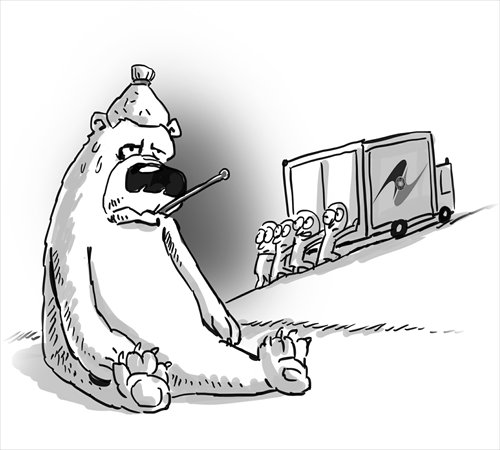Russia’s economic woes mean Eurasian Economic Union faces a tough start

Illustration: Liu Rui/GT
The Eurasian Economic Union (EAEU) came into force in January 2015. In addition to Russia, Belarus, Kazakhstan and Armenia, it will include Kyrgyzstan as of May 1, 2015.
The EAEU has international legal validity, having been established by the Eurasian Economic Union Treaty. The EAEU provides for free movement of goods, services, capital and labor, and will pursue coordinated, harmonized and single policy in the sectors determined by the Treaty and international agreements within the Union.
The EAEU's beginning comes during a difficult period in the economic life of Russia and relations between the countries initiating the Union. On the eve of the EAEU's birth, the leaders of Belarus and Kazakhstan have expressed negative sentiments about Moscow. The US and the EU sanctions against Russia led to a crisis for the Russian economy, illustrated by the sharp depreciation of the Russian ruble: In January 2014 one dollar was worth 35 rubles; in December 2014 it was 56 rubles; and in February 2015 one dollar was worth approximately 60 rubles.
Experts' opinions about what is happening are divided. Some believe that the Union is a fiction while others believe that it is necessary, but that its value will be realized only over the long term. Nevertheless, both sides agreed that the success of the EAEU's development depends on how fast the Russian economy recovers from its crisis. Even after the accession of Kyrgyzstan to the EAEU, about 80 percent of the Union's GDP will be that of Russia.
The EAEU will become a real competitive grouping slower than it would like. Its success will depend largely on how quickly Russia emerges from the crisis. At the same time, the longer Russia's geopolitical interests outweigh its economic ones, the less effective the Union will be. Its integration should take place primarily in the trade and economic spheres. It should be also noted that being a wealthy country means being a global trade partner.
Meanwhile, there are more than 30 countries that have expressed a wish to establish free trade regimes with the EAEU. Most interesting are the latest developments in Germany. From the point of view of economic policy, a joint economic space for the EU and Russia would be "absolutely appropriate," said the head of the Eastern Committee of German Economy Eckhard Cordes. In an interview with the German Public Broadcasting Company NDR on January 24, Cordes said that a free trade zone with the EAEU would make sense "from the political and economic perspective."
Martin Wansleben, chief executive of the Association of German Chambers of Industry and Commerce, in turn told the newspaper Neue Passauer Presse, that talking about the possibility of creating a joint economic space between the EU and the EAEU could become a "bridge" for exiting the Ukrainian crisis.
The German Minister of Economy Sigmar Gabriel pointed to support from German Chancellor Angela Merkel in a discussion on the possible establishment of a free trade area between the EU and the EAEU. "I am delighted that the chancellor had taken the initiative," said Gabriel in his interview to Der Tagesspiegel. Earlier, Gabriel called Russian President Vladimir Putin's idea on the establishment of a free trade zone stretching "from Lisbon to Vladivostok" "possible." According to Gabriel, the condition for this would be the implementation of a peace plan for Ukraine. Merkel, in turn, expressed readiness for economic cooperation with Russia, if peace is established in Ukraine.
A global world gives chance for any country and any trade block to be a prosperous one. The success of transition will depend on achieving a healthy balance between the conflicting goals and expectations of numerous players. Big powers should try to achieve harmony between their strategic interests, the aspirations of the peoples concerned and the means available.
The author is an external researcher at the Kyrgyz National Institute for Strategic Studies. opinion@globaltimes.com.cn